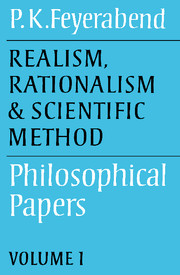Book contents
- Frontmatter
- Contents
- Introduction to volumes 1 and 2
- PART I ON THE INTERPRETATION OF SCIENTIFIC THEORIES
- PART 2 APPLICATIONS AND CRITICISMS
- 8 Introduction: proliferation and realism as methodological principles
- 9 Linguistic arguments and scientific method
- 10 Materialism and the mind–body problem
- 11 Realism and instrumentalism
- 12 A note on the problem of induction
- 13 On the quantum theory of measurement
- 14 Professor Bohm's philosophy of nature
- 15 Reichenbach's interpretation of quantum mechanics
- 16 Niels Bohr's world view
- 17 Hidden variables and the argument of Einstein, Podolsky and Rosen
- Sources
- Name index
- Subject index
16 - Niels Bohr's world view
Published online by Cambridge University Press: 05 June 2012
- Frontmatter
- Contents
- Introduction to volumes 1 and 2
- PART I ON THE INTERPRETATION OF SCIENTIFIC THEORIES
- PART 2 APPLICATIONS AND CRITICISMS
- 8 Introduction: proliferation and realism as methodological principles
- 9 Linguistic arguments and scientific method
- 10 Materialism and the mind–body problem
- 11 Realism and instrumentalism
- 12 A note on the problem of induction
- 13 On the quantum theory of measurement
- 14 Professor Bohm's philosophy of nature
- 15 Reichenbach's interpretation of quantum mechanics
- 16 Niels Bohr's world view
- 17 Hidden variables and the argument of Einstein, Podolsky and Rosen
- Sources
- Name index
- Subject index
Summary
INTRODUCTION
In his essay ‘Quantum Mechanics Without “the Observer”’ (in [20], 7–44), Popper criticizes the Copenhagen Interpretation and suggests construing the quantum theory as a ‘generalization of classical statistical mechanics’ ([20], 16). The uncertainty relations, he says, set ‘limits to the statistical dispersion … of the results of sequences of experiments’ ([20], 20) and not to what can be said about individual systems. Some strange features of orthodox microphysics are due either to a misinterpretation of probability, involving some ‘very simple mistakes’ ([20], 42); or else they are a straightforward consequence of the fact that the quantum theory is a statistical theory. For example, ‘the reduction of the wave packet … has nothing to do with quantum theory: it is a trivial feature of probability theory’ ([20], 37). The idea of probability that is presupposed in all these arguments, however, is Popper's propensity interpretation. Adopting this interpretation suffices for making clear what the quantum theory really is: a ‘generalization of classical statistical mechanics’ ([20], 16). This is Popper's position as I understand it.
This position, it seems to me, is attractive enough as long as one does not carry the analysis too far. But it breaks down when confronted with all the facts which Bohr wanted to take into account. Altogether Popper's criticism and his alternative proposals once more reveal the strong points of the Copenhagen philosophy, and especially of the ideas of Niels Bohr.
Today it is very difficult to find a satisfactory account of these ideas.
- Type
- Chapter
- Information
- Realism, Rationalism and Scientific MethodPhilosophical Papers, pp. 247 - 297Publisher: Cambridge University PressPrint publication year: 1981
- 5
- Cited by



